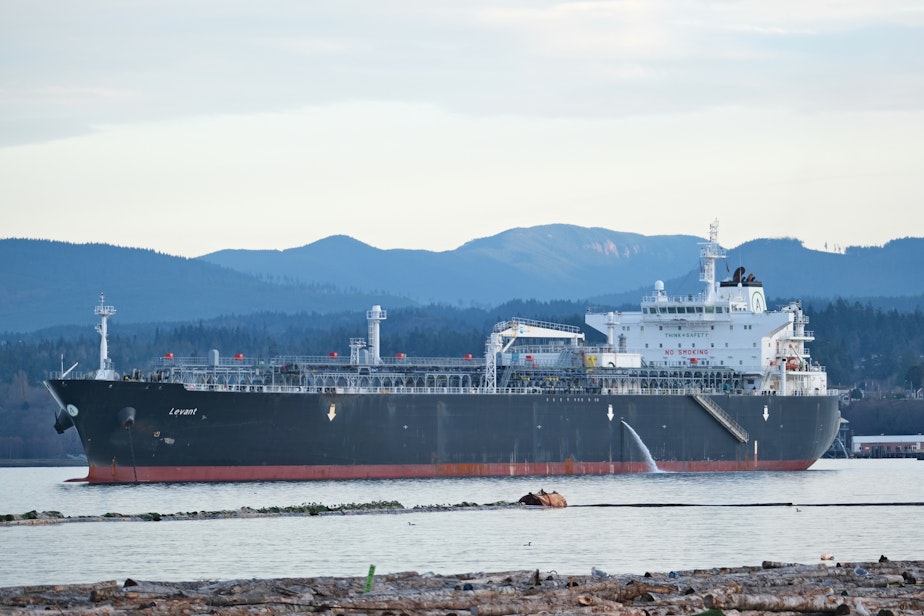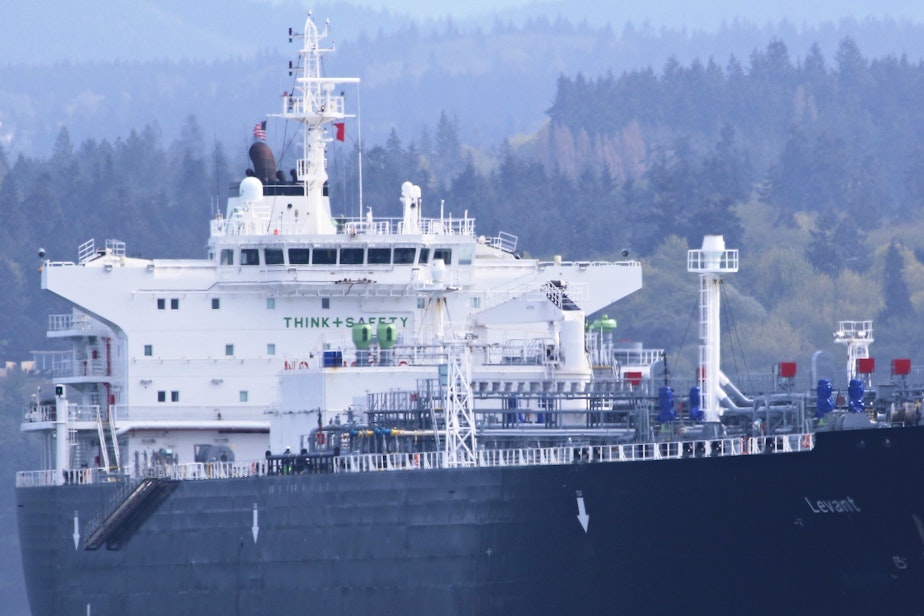Speed, small talk led to oil-tanker crash, feds find

A tanker transporting liquefied petroleum gas was coming in too fast and at too steep an angle when it crashed into a wharf at Cherry Point, Washington, north of Bellingham, the National Transportation Safety Board has found.
It didn’t help that the captain and the pilot of the Levant engaged in two minutes of “non-pertinent conversation” on the bridge as the 741-foot-long ship bore down on the dock.
Federal accident investigators released their findings on the December 2019 crash on Thursday.
The tanker Levant had come from South Korea to load up on liquefied petroleum gas – a pressurized mix of propane and butane – at the Petrogas export terminal in Ferndale.
According to Alberta-based Petrogas, it is the only LPG export terminal on the west coast of North America.
As the inbound tanker passed Port Angeles, a pilot with Puget Sound Pilots climbed aboard to guide the unwieldy vessel to its destination.
These pilots are expert mariners, required by state law to take big ships through the twists and turns of Puget Sound.
Sponsored
The pilot maneuvered the Levant alongside the Petrogas wharf jutting into the Strait of Georgia, and the ship began the long process of loading its liquefied cargo.
After three days of taking on pressurized petroleum, the partially laden ship sat lower in the water. The captain decided Dec. 14 to wait out an especially low tide that night in deeper water before resuming loading.
A Puget Sound Pilot came aboard that evening and successfully guided the ship to an anchorage just under a mile away. Once the ship was at anchor, he went to sleep in the pilot's cabin.
The pilot rejoined the bridge crew about 3:40 the next morning, planning to tie up to the dock at 4:15 a.m. After a brief conversation with the captain, he got the ship under way, with two high-powered tugboats alongside.
"Coming in pretty hot"
The Levant got up to a speed of 5 miles per hour, at an angle of 80 degrees—nearly perpendicular—to the wharf.
“For about the next 2 minutes a conversation about non-navigational, non-operational matters took place between the master and pilot,” the safety board report states.
Then the pilot ordered the rudder hard to port.
“Something didn’t feel right,” he recalled later.
He walked outside to the ship’s starboard side to get a better look, then ordered the engines to stop.
Sponsored
A crew member told him the bow was less than two ship’s lengths, or less than 1,500 feet, from the dock.
The pilot ordered one of the tugs to pull straight back, but it was too late.
Stopping distances of loaded tankers are measured in miles, not feet.
One of the dock workers standing by to resume loading the Levant said the tanker was approaching “extremely fast.” Another said it was “coming in pretty hot” — faster than he had ever seen a ship approach the dock.
An officer at the bow radioed the bridge that the wharf was just 130 feet away. The pilot ordered the engines to slowly reverse.
Sponsored
Then, as the ship barreled to within 15 feet of the wharf, officers at the bow headed astern for their own safety.
The Levant plowed through the dock at 4:06 a.m., sending four dockworkers running for their lives toward shore.

The pilot ordered engines into full reverse and told the tugs to pull as hard as they could.
Two minutes later, the Levant came to a stop and began to move backwards.
Sponsored
The pilot radioed the dock to see if he could still pull alongside but was told the wharf was unusable, its southern end destroyed.
"Not paying attention"
About 10 minutes after the crash, the ship’s data recorder captured the pilot telling the captain, “I’m the one who was not paying attention to how close we were to the pier.”
The National Transportation Safety Board report said the pilot that night had been piloting vessels of unlimited tonnage since 2000, though it does not name any of the mariners involved in the crash.
Safety board spokespeople did not respond to requests for more information.
The Puget Sound Pilots organization did not respond to interview requests.
No one was hurt and no fuel spilled, but the wayward tanker did $6.75 million in damage to the industrial dock.
The ship suffered $1.5 million in damage, including four holes punched in its hull and a 4-foot-long crease in the bow.
The National Transportation Safety Board said the visiting pilot had not communicated his plan for the trip to the crew, which made it difficult for them to know if something was going wrong.
A “master/pilot exchange” of information between a ship’s captain and a pilot is required whenever a pilot takes control of a vessel.
As the crew returned to a wharf they had been docked at just hours before, “a condition of complacency likely existed with the pilot and bridge team because of the short distance back to the wharf,” the report states.
“The vigilance of a pilot and bridge team should be increased, not decreased, with a ship’s proximity to dangers and obstructions.”
Directly below the Levant’s bridge, where the costly errors identified by federal investigators unfolded, green letters close to two feet tall urged anyone who could see them:
“THINK + SAFETY”





